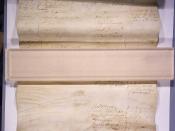Articles Of Confederation
The years 1781-1789 presented a critical period in American history and were a decisive time in the development of our country. Congress was in financial ruin, and was unable to enforce its power upon the states, which were arguing among themselves over issues such as state boundaries and interstate commerce. In fact, the financial situation in the United States during this period was so deplorable that it led to Daniel Shay's rebellion in 1787, in which poor farmers closed a number of state courts and threatened to seize the federal arsenal in Springfield- they were eventually put down not by the weak federal government but by a state militia from Massachusetts. Upon studying further into the early history of our country, however, one can see that the principal reason for this nationwide civil chaos and unrest was due to the nation's weak early written Constitution- the Articles of Confederation.
These Articles, ratified at the beginning of the Critical period, contained many flaws and weak points, such as the nation's lack of a functional system of trade and a weak centralized government which relied too heavily on state decisions to function.
Trade, both foreign and interstate, was a primary example of the Articles' shortcomings. Congress lacked the power to regulate trade- this resulted in a variety of consequences. For example, as Document A illustrates, states were able to tax each other's goods and impose imports on these products- Congress lacked the power to control this in order to insure a fair system of interstate trade. Additionally, the value of foreign exports did not steadily increase as the national population grew, as shown in Document B; this also helps to demonstrate the ineffectiveness of the trade system established by the Articles. Finally, Document F shows the effects of...


